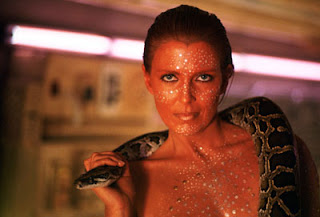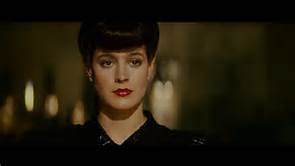This is my entry in the April Showers Blogathon hosted by MovieMovieBlogBlog
"Who is Philip K. Dick?" This question may cross your mind, especially if you are not a science fiction fan. 35 years ago the question might have even puzzled some sct-fi fans. (Dick had a following, to be sure, but even I, as an avid reader of sci-fi, was unaware of him until the Science Fiction Book Club made his last novel the featured selection one month.) But today, it is probably a lot rarer to find people who have never even heard the name, even if they are not familiar with his work. After all, Dick has been a hot commodity for sci-fi extravaganzas since the first adaptation of his work appeared on the big screen in 1982. To be sure, even if you don't know who Philip K. Dick is, you have heard of his work, since almost a dozen adaptations of his novels and short stories have hit the theaters over the years.
The current TV series being produced by Amazon, The Man in the High Castle, is only the most recent film version of Dick's work (that being based on Dick's Hugo Award winning novel of the same name). A list of movies you may have seen that were inspired by Dick's work include Total Recall (both the 1990 Schwarzenegger extravaganza and the recent remake, and to some extent the TV series Total Recall 2070), the Tom Cruise film Minority Report, director Richard Linklater's animated film version of A Scanner Darkly, and a handful of others, including today's entry, Blade Runner. (BTW, later this year a sequel to the original Blade Runner is due to hit the theaters).
Dick had a fan base throughout his writing career, but he died in 1982, before the release of even the first theatrical film adaptation of his works, so he didn't get to see how his popularity increased over the years. His works generally carried a theme of what it means to be human and what is reality. You can really get some insight into Philip K. Dick by reading one of his biographies, the best of which, in my opinion, is a 2006 book, Counterfeit Worlds: Philip K. Dick on Film, which includes an overview of his life.
Blade Runner (1982)
Blade Runner is a (seemingly) never ending conundrum of a movie experience. It was released in 1982. But the director, Ridley Scott, apparently was never satisfied with it. In 1992, he released "The Director's Cut", which eliminated Harrison Ford's voice-over and added a few scenes that had been left on the cutting room floor. But even that was apparently unacceptable, so in 2007, "The Final Cut" was released. In all there have been 7 versions of the film, some with very minor alterations, but still... The Final Cut is the one that Scott likes the best, but I have always preferred the original theatrical release, mostly because Ford's narration adds a bit more of a film noir feel to the movie. (The other two major versions cut this out). My review will cover the Final Cut (although I miss the voice-over, there are key changes in the final cut that intrigue me)
The film takes place in the future of 2019 (from a 1982 view, 37 years in the future). There seems to be a problem with overpopulation in the film, and the world is rather stark and gritty. Rain is constantly falling and I think the rain adds a certain feel to what the movie is. Rain as a metaphor can be seen as a cleansing agent, and if any world ever need cleansing it is the Los Angeles of 2019 as seen in this film. Personally, I think it would take a rain of Biblical proportions to clean up this reality...
In this vision of the future, androids, called replicants, are almost identical to humans. They are used as slave labor. In the pre-history, from the movie's standpoint, a bunch of replicants banded together and tried to start a revolution, and as a result, a law was made that banned replicants from Earth. This wasn't a "replicants must use the inferior bathrooms outside the establishment" type of banning, like the racist South did to the black people in the first part of the 20th century. Replicants were under a death penalty if they were found on Earth, and a special unit of the police force, called "Blade Runners" was formed to hunt them down and exterminate them (called "retirement".)
The movie opens with an interview of Leon (Brion James), a suspected replicant. The interview involves using a "Voight-Kampff machine", which supposedly, by way of several questions and readouts from it's screens, can determine whether a subject is human or a replicant. During the interview Leon shoots his interviewer, thus exposing the fact that he is indeed a replicant.
 |
| Leon (Brion James) |
Rick Deckard (Harrison Ford) is forced by his former boss to come out of retirement to hunt down this, and three other replicants; Leon, Zhora (Joanna Cassidy), Pris (Darryl Hannah) and Roy Batty (Rutger Hauer) have escaped from off-world and come to Earth, illegally. (BTW, I'm not sure why Roy gets a last name, but the others don't, but I'm sure the reason is probably subversive...)
 |
| Deckard (Harrison Ford) |
 |
| Zhora (Joanna Cassidy) |
 |
| Roy Batty (Rutger Hauer) and Pris (Darryl Hannah) |
At first, Decard is accompanied by Gaff (Edward James Olmos), an officer of the police force who speaks only in a cityspeak dialect and has an affinity for creating origami figures out of scraps of paper. These origami figures aren't just random, however. The first one is a chicken which he creates while Deckard tries to talk his way out of the job of hunting down the replicants.
 |
| Gaff (Edward James Olmos) |
Deckard and Gaff go to Leon's apartment where they find a stash of pictures. Why would an adroid, who only has a four-year life span, want to hold on to pictures? This becomes part of the driving force of the picture, making it not just a cop tracking down criminals movie, but essentially dwelling on the Philip K. Dick theme of what defines a human.
On another track of the same theme, Deckard visits the Tyrell Corporation, where Dr. Eldon Tyrell (Joe Turkel) has Deckard use his Voight-Kampff device on his secretary, Rachel (Sean Young). After a long session with the machine, Deckard determines that Rachel is a replicant. But Rachel is a special "new prototype" replicant, one which has been given extensive memories, thus she thinks she has had a past, including growing up. Once again, the "phildickian" theme comes into play. Is she truly human just because she has memories? No. Which calls into question, for those of us with the imaginative side anyway, are any of our memories truly our own... creepy, huh?
 |
| Rachel (Sean Young) |
As to why these replicants came to Earth in the first place, that is revealed gradually over the course of the movie. Roy Batty, as the leader, is very close to his expiration date (and if you question how, or why the replicants know they have an expiration date, you are in my same boat). They have come to demand that Tyrell give them an extension on their lives. They need a contact to get them in to see Tyrell, and they go to several people who are involved in the process to find a contact, killing each contact after their use to the replicants is done.
Ultimately, Deckard eventually terminates Zhora, Leon and Pris, leading to a final battle between Deckard and Roy Batty. The replicant becomes a bit philosophical at the end:
"I've seen things you people wouldn't believe. Attack ships on fire off the shoulder of Orion. I watched C-beams glitter in the dark near the Tannhauser gate. All those moments will be lost in time.. like tears in rain. Time to die."
Spoiler Alert! The ending of the original theatrical release had Deckard and Rachel leaving together, heading North. Gaff had left a telling origami of a unicorn, indicating that he had been at Deckard's apartment but had not retired Rachel. In the final cut, a previous sequence involving a daydream of Deckard thinking about a unicorn was included, which seems to imply that Deckard himself is also a replicant (otherwise how would Gaff know about the unicorn memory...?) The final cut deletes the actual scenes of Deckard and Rachel leaving, making their future less predictable. Will Gaff eventually track down the pair and eliminate them both? We don't know.
One added note: It's still raining at the end of this movie (unless you see the original cut, but those scenes take place outside the city). I guess the cleansing is ongoing...
Hope you folks enjoyed the flick. If my engine isn't waterlogged by now, its time to fire up the old Plymouth and head home. Until, next time, watch out for replicants. (Or if you are a replicant, then watch out for blade runners...)
Quiggy







I think of Dick as the W.R. Burnett of sci-fi guys. The writer the movies love to adapt. Burnett was that way in crime.
ReplyDeleteThe rain and the voice-over in the original really amped up the noir feeling of the movie.
Dick became one of my favorite writers after i discovered him. That pervasive paranoia and psychosis fit in with my own personality quite well. Thanks for reading.
DeleteI, too, prefer the heavily narrated version, for the same reason as you. Great review! Thanks for participating in the blogathon!
ReplyDeleteThanks for letting me in and thanks for reading.
DeleteExtremely stylish and influential movie--and Philip K Dick is a true visionary and futurist. I love the production design, script and stellar cast in this one. It's on my must-watch-again list!
ReplyDeleteGreat review and pics, Quiggy!
-Chris
PDK is an acquired taste (and if you only knew how much I hate that phrase, you'd know how adamant I am about using it...) Check out the book I referenced if you can find it. Thanks for reading.
Delete